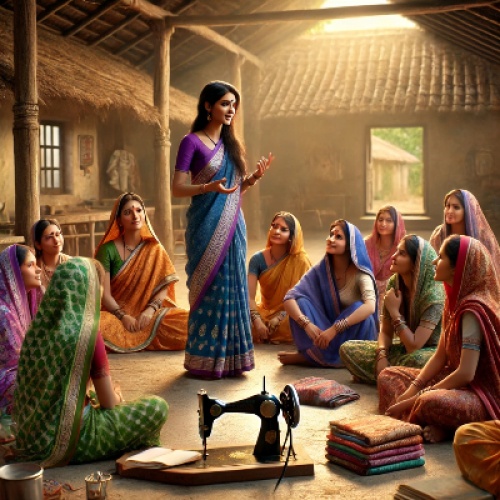Naina, the daughter of a humble farmer, had always felt the constraints of these traditions. She had seen her mother wake before dawn to prepare food, care for the family, and work in the fields alongside her father, only to have her contributions go unnoticed. She had watched her elder sister's education cut short so she could be married off. And she had felt the disappointment in her father's eyes when she voiced her desire to study beyond high school.
But Naina was different. She carried within her the fire of change, even if she did not yet know how to wield it.
It began on an evening much like any other, with the scent of cow dung fires in the air and the distant murmur of men gathered at the tea stall. Naina had invited a few women - her neighbors, her childhood friends, her mother's acquaintances - to the village's small, dusty community hall. They came hesitantly, casting wary glances over their shoulders, as if afraid their husbands or in-laws might disapprove.
When the women had settled, Naina stood before them. "We work harder than anyone else in this village," she said, her voice steady but gentle. "Yet, we own nothing. We earn nothing. Our labor is taken for granted. We have no voice in our own lives."
A murmur of agreement ran through the small gathering. She saw the flicker of something - hope? curiosity? - in their eyes.
"What if we changed that?" she continued. "What if we found a way to earn, to learn, to stand together? What if we built something of our own?"
Silence. Then, an older woman, Rukmini, the widow of a respected farmer, spoke up. "How can we, beti? We have no money, no land, and no support."
"But we have each other," Naina countered. "And that is enough to begin."
And so, the Varunpur Women's Collective was born.
At first, their ambitions were modest. They pooled their meager savings to buy raw materials and began stitching quilts and making papads to sell in the nearby town. They gathered in secret, working in borrowed spaces, stitching their determination into every seam and rolling their dreams into every crisp papad.
As their small enterprise began to take shape, so did their confidence. Word spread, and more women joined - Kamala, whose husband squandered their earnings on alcohol; Radha, who had never set foot outside the village; Meena, who had been told that a woman's place was in the kitchen. Each of them carried their own burdens, their own silent struggles, but within the walls of the collective, they found something they had never known before: agency.
Their first major challenge came when the village headman, a staunch traditionalist, heard of their efforts. He summoned Naina and the others to his courtyard, his eyes dark with disapproval.
"You are disrupting the balance of our village," he said, his tone measured but firm. "Women do not run businesses. It is not their place."
Naina met his gaze without flinching. "Then perhaps it is time for that to change."
The headman scoffed, but he underestimated the quiet strength of the women he dismissed so easily. With the help of a social worker from the nearby town, they registered their collective as a self-help group. They learned about microloans, business management, and legal rights. Slowly, they expanded - selling their products beyond the village, securing a stall at the local market, and even negotiating with a wholesale buyer.
But progress was not without its price. The men of the village grew uneasy, their authority threatened by their wives' newfound independence. Kamala's husband forbade her from attending meetings. Radha's mother-in-law called her a disgrace. Naina's own father warned her to stop before she brought shame upon the family.
Still, they persisted.
When the festival season arrived, the collective took a bold step. They organized a small exhibition in the village square, displaying their handmade goods for all to see. The response was overwhelming. People - men and women alike - marveled at the quality of their work. Orders poured in. Even the headman, begrudgingly impressed, admitted that they had done something remarkable.
For the first time, the women of Varunpur were seen, truly seen, as more than just daughters, wives, and mothers.
But their greatest victory was yet to come.
One evening, as the women sat together, counting their earnings, a young girl approached - Gita, no more than ten years old. She held out a notebook, her eyes wide with hope. "Will you teach me?" she asked.
And in that moment, Naina knew - their movement was bigger than just financial independence. It was about rewriting the future.
The collective expanded its vision, introducing literacy classes, health workshops, and skill training sessions. They fought for the education of their daughters, demanding that the local school enroll more girls. They lobbied for better healthcare, challenging age-old superstitions that had kept women from seeking medical help.
With each small victory, the fabric of Varunpur began to change.
One day, as Naina walked through the village, she saw something that made her pause. A group of men stood at the tea stall, watching as their wives and daughters carried bags of fabric, notebooks, and sewing kits. But instead of resentment, there was something else in their eyes - acceptance, perhaps even pride.
She smiled.
Varunpur was no longer just a village bound by tradition. It was a village where women had found their voice, their purpose, and their place.
And it all began with a simple meeting in a dusty community hall.






